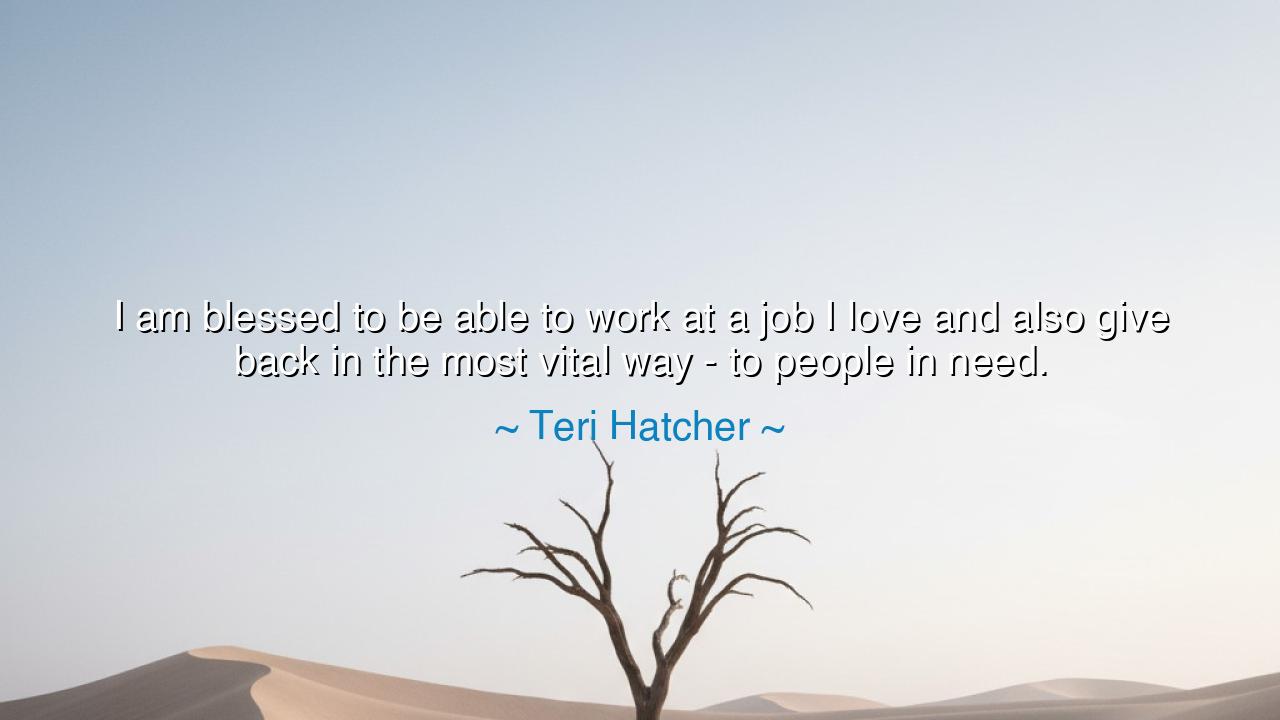
I am blessed to be able to work at a job I love and also give
I am blessed to be able to work at a job I love and also give back in the most vital way - to people in need.






The words of Teri Hatcher—“I am blessed to be able to work at a job I love and also give back in the most vital way – to people in need.”—speak with the timbre of gratitude, humility, and purpose. In these words lies a truth known to the ancients: that life finds its highest meaning not merely in labor, nor even in joy, but in the marriage of personal fulfillment with service to others. To love one’s work is fortune indeed, but to have that love overflow into giving—this is the mark of a soul aligned with the divine.
The ancients often spoke of the blessing of vocation. The craftsman who delighted in shaping wood, the poet who rejoiced in verse, the farmer who loved the feel of earth—all these knew joy because their labor was not drudgery but harmony with their nature. Yet the wise among them taught that such blessings must not be hoarded. Just as rivers must flow and not stagnate, so must the fruits of one’s labor be shared with the thirsty. Hatcher’s words echo this law: to hold both joy in one’s work and generosity toward others is to live in fullness.
History bears witness to this principle. Think of Florence Nightingale, who loved the science of nursing and the art of healing. Her passion for her work carried her into the bloodied tents of Crimea, where countless soldiers lay forgotten. Yet she did not only fulfill her own calling; she gave herself to those in desperate need, transforming her vocation into a gift for the broken. Her legacy proves the truth of Hatcher’s words: that the union of loved labor and service to others births miracles that outlive the worker.
The meaning of the quote is therefore twofold. First, it affirms the sacredness of finding joy in what we do. To toil without love is to erode the soul; to labor in passion is to be renewed even in effort. Second, it teaches that such joy must not terminate in self. When love for work is poured out as service, it transcends mere career and becomes a calling. In this way, work ceases to be about the self alone—it becomes a bridge to others, a vessel of compassion.
And yet, Hatcher wisely adds: it is the “most vital way” when we give to “people in need.” For needs are the true measure of where our gifts must flow. The strong must serve the weak, the fortunate must aid the struggling, the joyful must comfort the sorrowful. This is not charity as ornament but as necessity, as vital as food to the hungry and water to the parched. The ancients would call this justice: that blessings are not truly ours until they are shared.
For us, the lesson is clear: seek not only a job you love, but one that allows your gifts to flow outward, touching lives beyond your own. And if your daily labor does not directly serve the needy, then let your earnings, your time, your skills become channels of generosity. No one is too small to give, and no gift offered with sincerity is too little to matter.
The practical path is this: reflect each day not only on how your work sustains you, but on how it sustains others. Ask: “Whom have I lifted by what I do?” Take joy in your labor, but guard against selfishness. Dedicate a portion of your time, your wealth, or your energy to those who cannot repay you. For in this giving, your own joy will be multiplied, and your work will become not only livelihood but legacy.
Thus, let us pass down this teaching: the highest blessing is not only to love what you do, but to let that love become light for those in darkness. For in lifting others, we ourselves are lifted; in healing others, we are healed. This is the wisdom of the ancients, confirmed in the words of Teri Hatcher—that fulfillment is not found in self alone, but in the sacred act of giving back to people in need.






AAdministratorAdministrator
Welcome, honored guests. Please leave a comment, we will respond soon